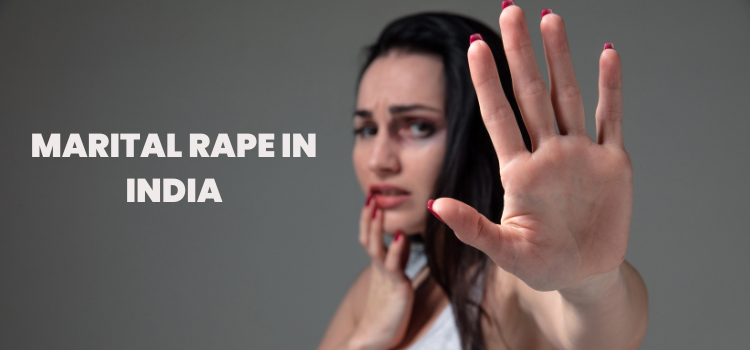Marital rape in India - a brief overview
Posted On : February 1, 2023

Table of Contents
Introduction
Marital Rape in India is not considered a crime under the Indian Penal Code. Section 375 of the IPC exempts a husband from the charge of rape if the wife is above the age of 15. There have been several cases where the Supreme Court of India has been petitioned to declare marital rape as a crime, but so far, no such declaration has been made. However, the court has recognized the need for legal protection for women in abusive marital relationships and has granted relief to victims through provisions under domestic violence laws.
The Scenario in India
In recent years, there have been several high-profile cases that have brought the issue of marital rape to the forefront. Some of the notable cases are:
1. Independent Thought vs Union of India (2017) - The Supreme Court held that sexual intercourse with a girl below 18 years of age, even if she is a wife, is rape.
2. RIT Foundation vs Union of India (2019) - The Delhi High Court directed the government to consider amending laws to make marital rape a criminal offence.
3. J.S.Verma Committee Report (2013) - The report recommended that marital rape be made a criminal offence.
Despite these cases, marital rape remains exempt from prosecution in India. The issue is still highly debated and there is ongoing advocacy for legislative change to criminalize it.
Independent Thought vs Union of India (2017) is a landmark case in India, which dealt with the issue of child marriage and the sexual abuse of minors within marriage. The case was filed by an NGO called Independent Thought, challenging the constitutional validity of an exception in the Indian Penal Code (IPC) that exempts a husband from the charge of rape if the wife is above the age of 15.
The Supreme Court of India in this case held that sexual intercourse with a girl below 18 years of age, even if she is a wife, is rape and is punishable under the Indian Penal Code. The court noted that child marriage was a violation of fundamental rights and that the exception in the IPC was arbitrary and discriminatory towards minors.
This judgement was a major milestone in the fight against child marriage and the sexual abuse of minors within marriage in India. The court's ruling filled a significant gap in the law and gave a voice to minors who were victims of sexual abuse within marriage. The decision was widely welcomed and was seen as a step towards achieving gender justice in India.
RIT Foundation vs Union of India (2019) is a case heard by the Delhi High Court, which dealt with the issue of marital rape and the need for legal protection for women in abusive marital relationships. The case was filed by the RIT Foundation, an NGO, challenging the constitutional validity of section 375 of the Indian Penal Code (IPC), which exempts a husband from the charge of rape if the wife is above the age of 15.
The Delhi High Court in this case directed the government to consider amending laws to make marital rape a criminal offence. The court noted that the exemption in section 375 of the IPC was violative of the right to life and personal liberty and was discriminatory towards married women. The court also stated that the issue of marital rape needed to be addressed in a comprehensive manner, taking into account the various socio-cultural realities in India.
This case was an important step towards the recognition of marital rape as a crime in India and highlighted the need for legislative change to address the issue. Despite the court's direction, marital rape remains exempt from prosecution in India and the issue continues to be debated and advocated for by various stakeholders.
J.S. Verma Committee Report was a committee constituted by the Indian government in 2012 in the aftermath of the brutal gang rape and murder of a young woman in Delhi. The committee was headed by former Chief Justice of India, J.S. Verma and was tasked with reviewing and strengthening the laws relating to sexual assault and violence against women.
One of the key recommendations made by the committee was the criminalization of marital rape. The committee stated that the exemption of marital rape from the definition of rape under the Indian Penal Code was violative of the constitutional rights of women and was discriminatory in nature. The committee recommended that marital rape be made a criminal offence, regardless of the age of the wife.
The J.S. Verma Committee Report was a significant development in the fight against sexual violence and gender-based discrimination in India. The recommendations made by the committee were widely welcomed and were seen as a step towards achieving gender justice and the protection of the rights of women. However, the recommendations have yet to be fully implemented and the issue of marital rape remains exempt from prosecution in India.
In recent years, there have been several high-profile cases in India that have brought the issue of marital rape to the forefront. Some of the notable cases are:
1. Kavita vs State of Haryana (2020) - The case dealt with the issue of marital rape and the need for legal protection for women in abusive marital relationships. The High Court of Punjab and Haryana in this case stated that the exception in the Indian Penal Code (IPC) which exempts a husband from the charge of rape was discriminatory and needed to be reviewed.
2. Megha vs Union of India (2021) - The case was filed by a woman who was subjected to sexual violence and abuse by her husband. The case highlighted the need for a comprehensive law to address marital rape and the lack of protection for women in abusive marital relationships.
3. Shreya vs State of Madhya Pradesh (2021) - The case dealt with the issue of sexual violence and abuse within marriage and the need for legal protection for women in such situations. The High Court of Madhya Pradesh in this case noted the need for a comprehensive law to address marital rape and stated that the current laws were inadequate.
These cases have brought the issue of marital rape to the forefront and have highlighted the need for legislative change to criminalize it.
Conclusion
Marital rape is still not recognized as a crime in India, despite ongoing debates and calls for legislative change. The Indian Penal Code (IPC) exempts a husband from the charge of rape if the wife is above the age of 15. This exception has been widely criticized as being discriminatory and violative of the constitutional rights of women.
In comparison, many other countries have criminalized marital rape and provided legal protection for women in abusive marital relationships. In countries such as the United States, the United Kingdom, and Australia, marital rape is recognized as a criminal offence and is punishable under the law.
The situation in India is in contrast to these countries and highlights the need for legislative change to address the issue of marital rape. The ongoing debate and calls for change reflect the changing social and cultural realities in India and the need for a more progressive and gender-sensitive approach to address issues of sexual violence and abuse























